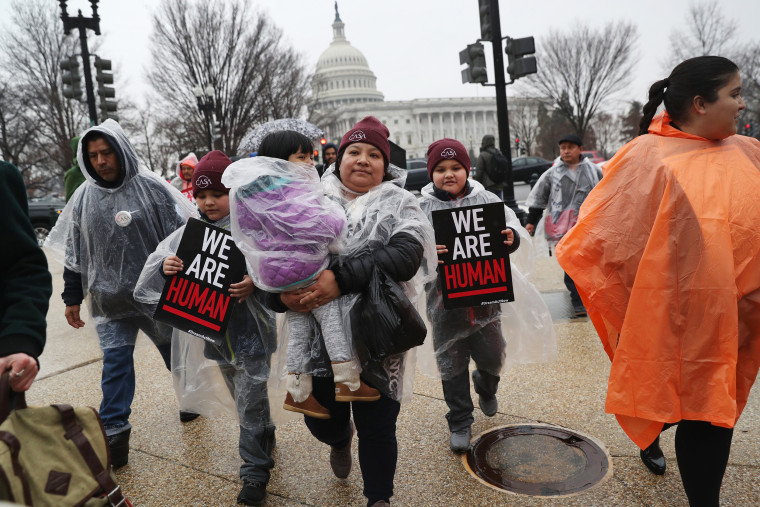WASHINGTON — The Senate ended its immigration debate this week exactly where it began — in a stalemate.
In a major blow to President Donald Trump, the Senate failed to pass legislation based on his proposal that would have made major reforms to the legal immigration system, built a border wall and provide citizenship to about half of the Dreamers in the country.
The measure was one of three proposals the Senate voted on that would have addressed the Deferred Action for Childhood Arrivals, or DACA, program, but it received the least support. Just over one-third of the Senate — 39 senators — voted for it, including 14 Republicans, likely killing the measure for good.
Its failure, and the inability of the Senate to pass two other proposals with bipartisan support Thursday, clearly demonstrates that Congress is no closer to figuring out a solution for Dreamers in legal limbo than they were when Democrats forced a government shutdown over the issue one month ago.
“I think it was important to demonstrate to the president and everybody else what the president was requesting and how much support it had," Sen. John Cornyn, R-Texas, said. "I think that tells us we need to go in a different direction.”
The Senate voted 54-45, short of the 60-vote threshold necessary, to pass one bipartisan agreement that was a pared-down version of the presidents'.
What happens next is uncertain. House Speaker Paul Ryan said that he'd bring legislation to the House floor but only a bill that the president would support.
The president and his team worked against the bipartisan proposal that was written by eight Republicans, seven Democrats and one Independent.
The Department of Homeland Security sent out a scathing press release the morning of the votes against the main bipartisan bill. And in the minutes leading up to the votes, the president tweeted that it would be "a total catastrophe."
The bipartisan proposal used the presidents' as a framework but pared it down from there. Like Trump's proposal, it included a path to citizenship for 1.8 million Dreamers. But it differed in that the $25 billion for border security component would be allocated over ten years instead of up front. It didn't reform legal immigration, like the president's plan, by drastically reducing family-based migration and ending the diversity visa lottery. Instead it would have prohibited Dreamers who gain legal status from sponsoring their parents.
Sen. Lindsey Graham, R-S.C., said nothing will pass until the president starts leading on the issue.
"The White House's position and from DHS were just really over the top," Graham told reporters. "The president has the ability to lead on this issue. He’s got to take the reins back from the people in the White House who can never get to yes."
But the political pressure was great for both Republicans and Democrats. On the right, the conservative Heritage Action political group released a notice to Republicans ahead of the vote warning Republicans to vote against the bipartisan bill, calling it "amnesty." On the left, the Dreamer group, United We Dream, also opposed the bipartisan bill, saying it "pits immigrant youth against their communities."
Despite senators from both parties saying they want a solution for immigration, they couldn't come to an agreement. In addition to the bipartisan bill and the presidents' framework, they also voted on skinny version authored by Sens. John McCain, R-Ariz., and Chris Coons, D-Del., that would also provide a path to citizenship for 1.8 million Dreamers but it doesn't provide money for a border wall. It failed with the support of 52 senators, which included just three Republicans.
A fourth Senate vote Thursday was a political messaging vote on sanctuary cities that would likely be turned into campaign advertisements in 2018 midterm elections against Democrats. Four Democrats, all in tough re-election races, joined all Republicans in the measure that ultimately failed.
Democrats demanded an open debate on immigration to find relief for Dreamers. But little debate took place on the Senate floor and the week culminated in a series votes that showed little except how divided the senate is.
Sen. Tim Scott, R-S.C., said the president's proposal was "a positive one" but said the Senate will have to "get on the same page again and look for an alternative that actually works."
But even the Senate is divided on that. Sen. John Kennedy, R-La., said the Senate should move in. "I don't want to waste anybody else's time anymore, including those of the American people," he said.
The Senate is recess for the next ten days for Presidents' Day.
